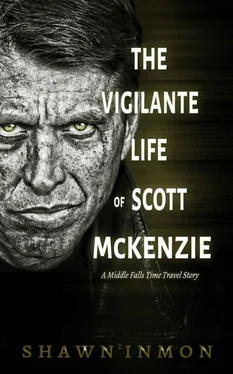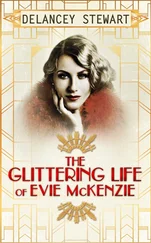Scott laughed and said, “I love it. It’s perfect. Thank you, Greta. I’ll get to work on it right away.”
Standing in the doorway, Scott could see almost all of it. One room constituted the kitchen, dining room, and living room. There was a small bedroom and bath off the back of the house. It sat in a small clearing ringed by trees. Beyond the sound of birds in the trees and a small brook that ran through the back of the property, it was completely quiet. For Scott, the best feature of the place was a covered front porch with a solid old rocking chair. He could envision many happy nights sitting there, reading and watching the world pass him by.

Chapter Fourteen

Scott cut and stacked enough firewood to get him through a long Vermont winter. He sharpened an old scythe he found in a back shed and cut back the encroaching vegetation. He reclaimed the area around the house as his own.
It’ll never get a spread in a magazine like House Beautiful , but I can’t imagine a more perfect place for me.
His new home was miles out of town, located off an old logging road, so he didn’t get a lot of drive by traffic. When someone did drive by, they were typically looking to get away from the world as well and left him alone. He couldn’t see much use in buying a vehicle, but he did buy a used bicycle at a yard sale. It was equipped with a basket big enough for a few groceries or a stack of books.
The rent that Greta charged him was so cheap that he didn’t need to work—his benefits gave him more than he needed for the simple life he led. He did take odd jobs around town from time to time, mostly to get himself out in polite company so he didn’t become a complete hermit.
When it became obvious to the denizens of Waitsfield that he wasn’t just passing through, he made a number of friends, including Louise, who ran the Waitsfield library. Like much of Waitsfield, the library was small, but it was a completely charming brick building with white columns in the front. He found out what day the out-of-town newspapers arrived and became familiar with the microfiche system. The small town library’s acquisition budget for non-local newspapers wasn’t large, but Scott subscribed to dozens and had them all sent to the library. Soon enough, their collection was the envy of all other library systems in Vermont.
Scott got in the habit of spending most of the day on Tuesdays and Fridays in the library. He designed a process where he scanned every out-of-town newspaper that came in for lurid stories of death and destruction. Each of those stories went into a notebook marked with the year. He knew he couldn’t stop all of them—there wasn’t much he could do about an airplane crash or a tornado touching down. He spent his evenings with a map of the United States, planning out where and how he could make a difference and how he could make it from one to another in time.
About a year after he started his research, Louise asked him, “What in the world are you doing, reading all those newspapers every week? Isn’t it the same news everywhere?”
He’d known that question was coming eventually and had an answer prepared.
“You’d be surprised how much difference there is. I’m thinking of writing a book about how different newspapers report the same story. That’s why I’m always sifting through the newspapers, looking for different angles.”
“Well, you’re certainly diligent about it. You’re my best customer!”
From experience, Scott knew that when he woke up again, he would only have whatever he’d had with him the day he had fallen asleep on his grandparents’ sofa.
That, and his memories.
He took a mail order course that taught him a number of tricks to improve his memory. The more he practiced, the better his memory got. After a few years, his memory become prodigious, and he filled it with a litany of dates, times, and names. A Hall of Fame for serial killers, rapists, murderers, and all-around awful people. He continually sorted and updated his list with the latest information that became available to him. It wasn’t unusual for a serial killer to emerge and Scott had to go back to a previous year’s notebook to make notes about where he had begun killing.
He found that true crime books, which were often deeply and impeccably researched, often provided the best insight into when and where would be the best place to stop a perpetrator. When Ann Rule began publishing her books in 1980, she became a go to source for him and he had a standing order with Greta for each new book.
Scott also knew that when he woke up, he would once again be in a weakened state, not yet recovered from his war wounds.
He wanted to have time to rest, rehabilitate and get strong, so he started researching events and bad happenings starting in the summer of 1974. That would give him time to get healthier, watch Cheryl and Mike get married—again—and get to wherever he needed to be to stop it.
He constantly battled with himself. One day he was anxious to get started on this new life, and the next he felt so happy with his quiet life in Vermont that he never wanted to leave it. He wanted to begin helping people and stop bad things from happening, but the longer he lived in this life, the more he would know.
Scott watched the seasons and years pass and he fell into a routine. He spent his two days each week in the Waitsfield library. He filled in for Greta at the used bookstore every fall so she could visit her children in Maine. There was something comforting about sitting among the dusty stacks, reading a new book and not knowing or caring if another customer would come in or not. Once each year, he made the trip back to Evansville to see Cheryl, Mark, and their brood of children, which had grown to include two new brothers for Andrea. They had named their oldest boy Scott.
Each time he visited, Cheryl and Mark both tried to convince him to move back to Evansville, but Scott never considered it. His home was in Vermont now.
In December, 1980, Scott was as shocked as the rest of the world to read about the murder of John Lennon. In picking out which cases he could do something about, Scott had typically tried to avoid high profile incidents. He didn’t want to become famous, or do anything that would put a crimp in his ability to move anonymously around the country. He knew he couldn’t let the murder of John Lennon pass unchanged, though.
Once he started making his list, the problem was in limiting it. He was initially shocked at how many bad things happened to good people. Over time, he realized that is the way of the world—part of the human condition.
His list grew. As the 1970s passed into the 1980s, serial killers became more prominent in the news. He followed their trails and researched their kills after they were captured to see if he could find an opportunity where he could have found and stopped them from killing early on. The more research he did, the more he wondered if he would actually be able to do what needed doing when the time came.
Can I really kill someone before they do something awful? But, what if I don’t? In a way, would that make me just as responsible?
It was a question he chased round and round in his brain as he drifted off to sleep each night.
The years passed quietly and easily for Scott. In the early spring of 2002, just a few months before his fifty-fourth birthday, he experienced a new pain. After all these years, he was used to pain flare-ups from his old war wounds, but this was something new. He did his best to put it out of his mind and concentrate on his work.
Читать дальше














